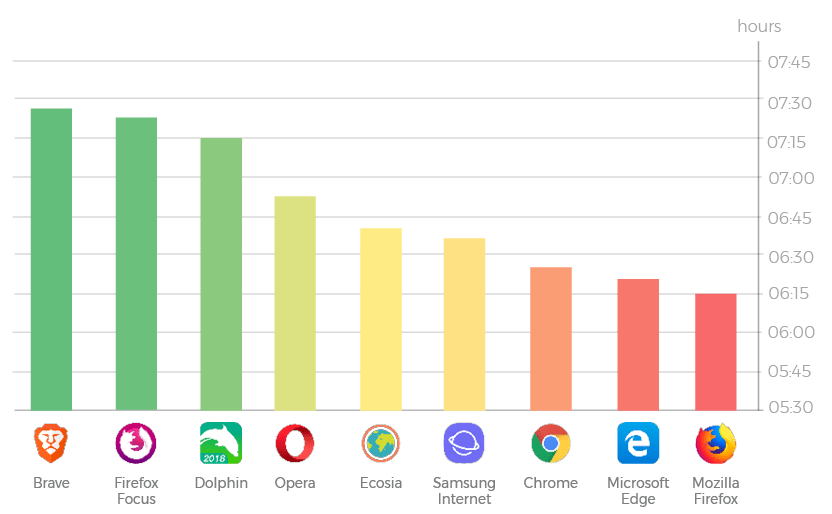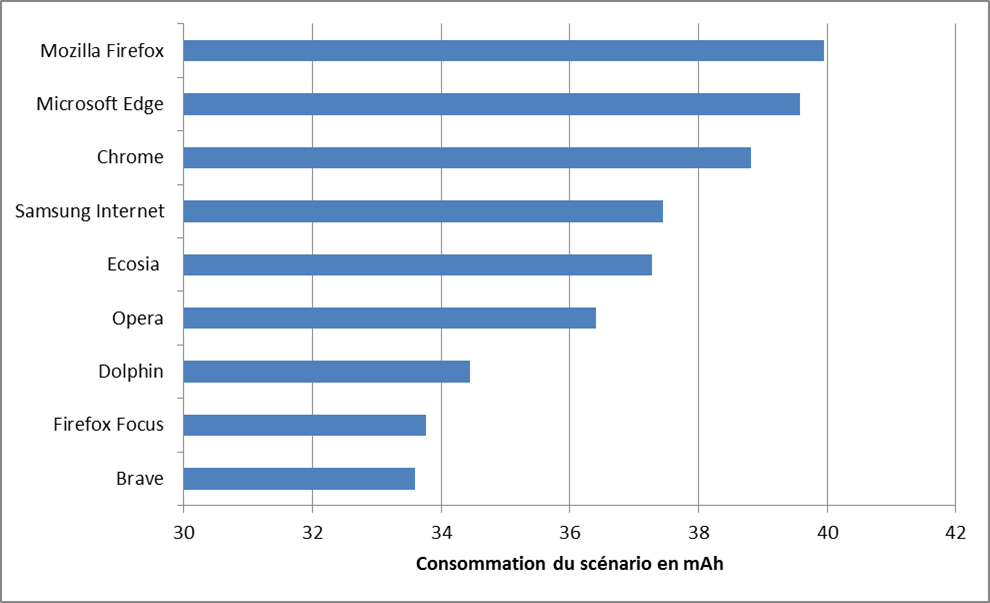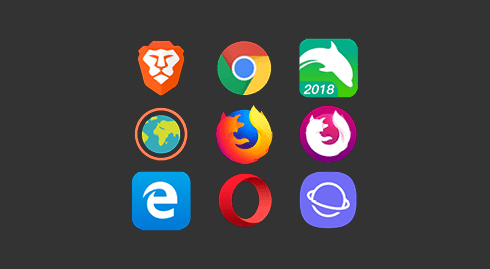2020 Edition: what are the best browsers to use on mobile?
The internet browser is one of the most critical applications of your smartphone. It allows you to access a multitude of services (Social Network, news, games …). It’s even more so when you don’t want to download an app and prefer to use a mobile site instead. Your browser is used almost continuously on your phone. It’s therefore responsible for some of the decline in the battery life of your smartphone.
It’s therefore important to choose the best browser if you want to increase the life of your smartphone.
Ranking
Find the methodology of this ranking at the end of the article.
We obtain a range of different browsers that varies between 6h15 and 7h26. This may seem small as a difference but over the total battery life of your smartphone, you will less stress your battery and ultimately avoid planned obsolescence. Not to mention a prolonged autonomy at the end of the day!

The browsers
Top 1: Brave

New browser on the market, Brave wants to make privacy a workhorse. It automatically blocks ads and trackers. This seems to pay on autonomy since Brave takes the lead with 7h26mn estimated autonomy for a continuous web use.
Top 2: Firefox Focus

Mozilla publishes Firefox Focus, a browser focused on privacy: default privacy policy, blocking tackers … It seems that just like Brave, this strategy allows to gain autonomy.
Top 3: Dolphin

Much less known than Chrome or Firefox, Dolphin is however very downloaded. With features similar to Chrome or Firefox, it’s a challenger to take very seriously.
Top 4: Opera

The Opera browser has an ad blocker and the ability to create a personalized homepage with a news feed. Its Mini version exists but could not be evaluated in this study. The autonomy is quite good but inferior of 30 minutes compared to our top 1: Brave.
Top 5: Ecosia

Based on Chromium, this German browser finances sustainable development actions (such as tree replanting) with searches carried out by users. Even if autonomy is not the worst, it’s unfortunate that this browser who wants only the good of the planet is not better placed in the ranking!
Top 6: Samsung internet

This is the browser pre-installed on all Samsung phones: Samsung Internet. Consumption close to that of Ecosia, probably because the browser is also based on Chromium.
Top 7: Chrome

Chrome, the Google Android browser, one of the most used browsers. The home page allows to consult a selection of articles of press. He’s in the top 3 of the worst browsers. Some heaviness coming from the history of the solution and the non-priority on privacy.
Top 8: Microsoft Edge

The new Microsoft engine is now available on Android. Maybe the bottom of the rankings is due to the non-adaptation of the engine for Android.
Top 9: Firefox

Published by Mozilla, the browser announces a reliability on the respect of the private life. We are, however, disappointed with his place in this ranking.
Conclusion
The choice of the browser should not only be about autonomy, but it is an important criterion. We observe that the 3 historical and recognized players (Microsoft, Google and Mozilla) are at the bottom of the ranking. This is probably due to the age of the applications, and therefore overweight code (Obesiciel or bloatware). But we can also go watch a performance race that was made at the expense of autonomy. Maybe the race between the 3 has not been beneficial to their improvement. We remember, for example, the Microsoft Edge benchmark … with only Chrome and Firefox. Maybe the arrival of new serious browsers will change the game.
We can note that the differences in autonomy between browsers are also related to certain features like the news feeds on the default home pages. However, the user has a margin of maneuver: disable these features if he doesn’t use them.
Note that the base open source Chromium which is found in different browsers (Brave, Samsung Internet, Ecosia …) isn’t necessarily the most optimized (We find most browsers in the middle of the ranking.) An optimization of the heart (and potentially better integration by publishers) would reduce the consumption of several browsers. Here we see the potential of open source that isn’t used fully.
A highlight of this benchmark, newcomers to the market with a real position on privacy are at the top of the ranking (Brave and Firefox Focus). Respect for privacy and the environment go in the same direction. This is a good signal for users.
Methodology
We perform our measurements of the real energy consumption of the phone with the tool GREENSPECTOR. The Samsung Galaxy S7 smartphone was used for this Benchmark.
The methodology aims to achieve a journey that is representative of the use of a user. We study how the browser behaves on the same course. The course lasts 5 minutes and is carried out 4 times to obtain reliable measurements.
Beforehand a preparation of the phone is carried out:
- Mastered configuration (brightness, Wi-Fi enabled …)
- Closing all applications and services: Allows not to be polluted by other applications and to have reliable measurements
- Removing browser caches
- Stabilized network access
The following course is then realized:
- Launching the browser on the home page configured at installation
- 20-second wait (foreground): measures the impact of the home page.
- For 3 sites of different types (Wikipedia, lemonde.fr, pinterest): Launch of the page, Scroll at the bottom of the page, wait of 20 seconds
- Launch again of the 3 sites to evaluate the impact of the caching
- Background browser setting (background): lets you see how the browser behaves when it is not in front of the phone.
The unit energy consumption obtained is then projected on continuous use to obtain final autonomy.
For information, here is the raw data of measured energy:


